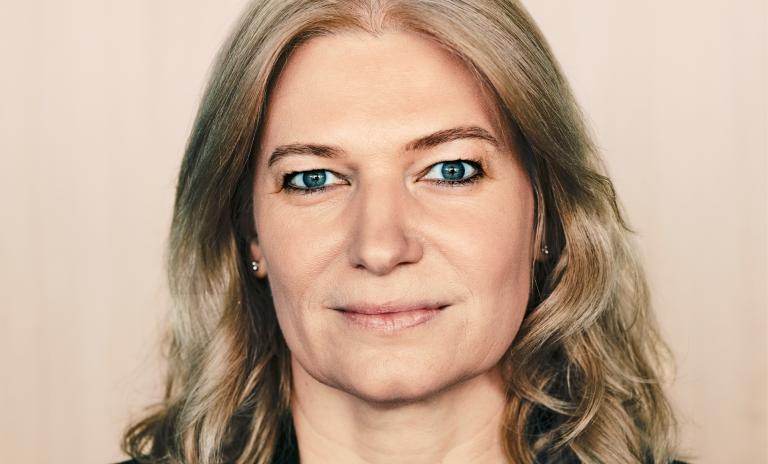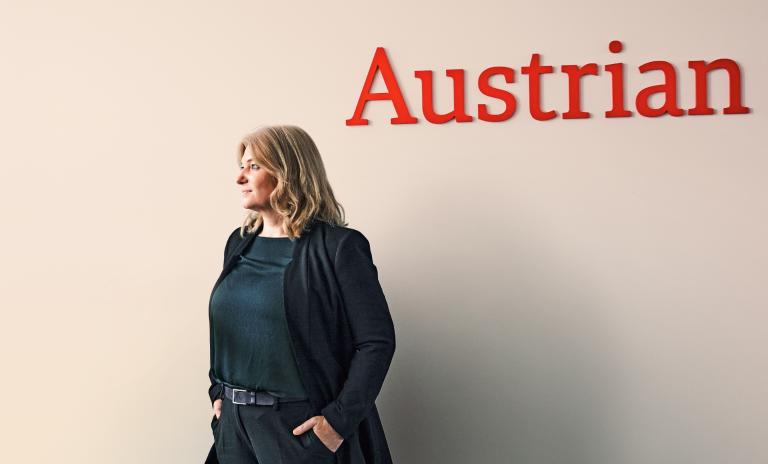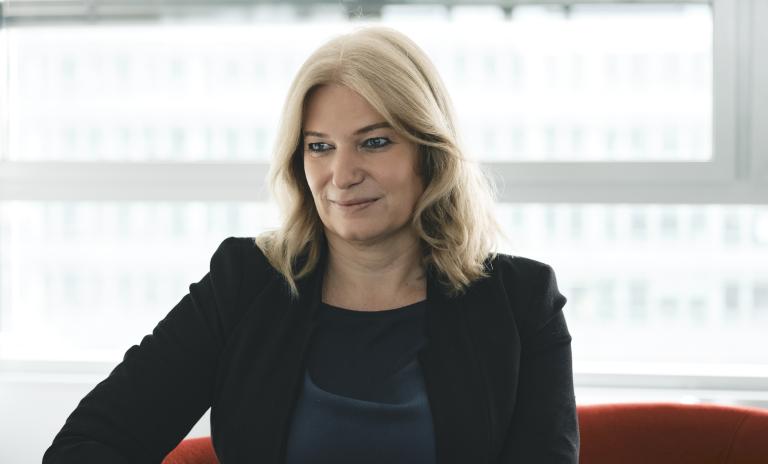Pace for impact
![{[downloads[language].preview]}](https://www.rolandberger.com/publications/publication_image/ta43_en_cover_j_download_preview.jpg)
In the new edition of Think:Act Magazine we explore the benefits of a calmer pace of life and business, and learn from the success of slow companies.


by Emanuele Savettiere
Photos by Philipp Horak
Annette Mann is one of only a few women around the world leading a major airline. The CEO of Austrian Airlines tells Think:Act how she is seeking to bring more diversity to her senior ranks as well as Austrian's cockpits and why travel by plane is here to stay.
Annette Mann is an outlier. A woman CEO in an industry dominated by men, Mann exudes confidence and is eager to help other women follow in her footsteps. The Lufthansa veteran, now CEO of Austrian Airlines, is actively creating opportunities to encourage other women to succeed in the aviation industry. That involves active measures to increase the number of opportunities for her peers to make their professional accomplishments seen and heard.

In this interview, Mann elaborates on just how she is helping women at Austrian Airlines gain greater visibility, a prerequisite for climbing the career ladder, and her strategies to improve gender diversity and inclusion, such as shared leadership roles and new working models. Mann, who steered Austrian Airlines through Covid-19-induced turbulences, is also taking another challenge head-on: making aviation more sustainable.
Only 7% of the CEOs at the world's top 100 airlines are female, according to a 2022 statistic. Why are there so few women in top roles in aviation?
That's a very good question that is hard to answer. I've always felt quite comfortable in aviation, but I have a hypothesis. Many large airlines have been around for decades. And when you look at the history of airlines, although it's a service industry, there was originally a very strong focus on engineering and operations. And so, lots of careers came out of that background with typically fewer women in these roles. That might probably be the reason why today there are still so few of us. However, I feel that's rapidly changing because most airlines fully understand by now that we're not building airplanes. Aircraft are our most expensive production factor, but we're in the service industry, meaning it's about people and hospitality. The types of roles and backgrounds you see going up the career ladder are changing. There's no reason why there shouldn't be more women, and I hope more and more are encouraged to join.
What about your own experience in aviation? What can you share from your own journey to the top?
Since joining the Lufthansa Group in 2003, Annette Mann has held a number of strategic and operational roles. She was responsible for various product-related areas until 2020, including developing and implementing Lufthansa's current first-class services and as vice president of product management at Swiss Airlines.
Most recently, she was in charge of corporate responsibility at Lufthansa before taking on the top job at Austrian Airlines in March, 2022.
This interview was conducted at the Global Peter Drucker Forum.
I have honestly never spent much time thinking about being a woman in my job. At the very beginning of my career, I worked in product management on the A380 team of Lufthansa. In that role, it was amazing how I could interact with totally different types of people – from the crazy, fancy design guy all the way to the nerdy engineer designing some little piece of the cabin. I learned early on how to communicate and also translate between totally different types of people. I think that helped me throughout my whole career. If you're a good communicator, that lets you address gender and diversity issues as well.
What are you doing to encourage more women to take up important roles at Austrian Airlines?
Let's look at women very early in their career when they don't have leadership responsibilities yet. We try to encourage them early on to take jobs which also involve some risk and give them visibility. Too many women are still a bit too idealistic. They're taking jobs where they work hard, and which are important but probably not so visible. We really try to encourage younger women to do something where others can actually see and feel their work, and where they learn to make decisions and take risks. Being more visible is super important at such an early stage.
Can you give me a specific example?
For example, our communications, public affairs and sustainability team has a high percentage of women, and we let them directly work with and interact with the board – same with HR or controlling. They present on topics which are very relevant for the company, learn constantly and are seen by senior managers. Another example is that we actively nominate female talents for awards and scholarships. There's a young woman in our operations team who just got promoted to team lead and won a scholarship at the WHU (Wissenschaftliche Hochschule für Unternehmensführung), one of the most renowned universities in Germany, and we support that to help her connect to larger networks.
"We really try to encourage younger women to do something where others can actually see and feel their work."
Then there's the issue of women getting into their first leadership positions in their late 20s and early 30s, a time when it's often also about having a family. That's why we have several shared leadership roles or tandems of two women or a man and a woman sharing the job. It works really well and makes it easier for them. We also have many different working models to support women in that stage of their career, because otherwise they might drop out or go somewhere else.
What about female pilots?
Still difficult. We would love to have many more. It's somehow so deeply entrenched in the mind of society that being a pilot is a very male job. Many women also still think, "Oh, it's hard later on to square the work with having a family." Well, female pilots actually say it works, so we try to have our female pilots visit schools or hold events where people can learn more about being a pilot. By the way, it's not just women that think they can't do it – being a pilot still has the image of being an elite job. Many men think, "Okay, if I'm not wealthy I cannot do this because first I'll need $100,000 to complete the training." But that's not true anymore. You need less than $10,000 at the beginning, which actually makes it cheaper than a lot of other educational endeavors.

Before coming to Austrian Airlines, you headed sustainability at Lufthansa. How are the things you learned there shaping how you approach your new role?
The sustainability role was a fantastic time to dig into that topic. Whenever I have conversations or read articles, I'm surprised how little knowledge there is about sustainability. It seems that everyone talks all day long about sustainability, but hardly anyone can do something basic like distinguish between emissions reduction and compensation. I'm so grateful that I was able to learn so much because, in my current job, hardly a day goes by without needing that kind of knowledge for being on panels, doing interviews or being questioned by employees and customers – also for steering the right topics. It's a tricky topic where, if you're not well educated, you're quickly on a slippery slope.
Aviation is among the top most energy-intensive industries. What are some of the concrete things airlines can do to minimize their carbon emissions? Will the use of sustainable aviation fuel (SAF) be a scalable solution?
In aviation, there are three ways to reduce CO₂ emissions. One, buying new planes. Every new plane consumes about 20-25% less fuel than the one it replaces. The second thing is to fly more efficiently. We need policies for that, because so far every European country still has its own air traffic control which leads to a lot of detours. You could easily unlock 10% in reductions by just organizing European airspace more efficiently. Fuels are the third aspect. In theory, you could run the world's 27,000 aircraft with sustainable aviation fuel. But where does this SAF come from? Lufthansa Group – which Austrian Airlines is part of – has about 15 different partnerships all over the world exploring different technologies. We have contracts with some companies that guarantee we will buy certain quantities if they invest in producing SAF. But it's still tough. Europe very much works through pressure and regulation, while the US handles it a bit smarter by motivating companies and offering tax credits. Europe was the front-runner for a long time, but now the US has taken over because they're just faster in scaling up, which makes us a bit jealous.
46%: The percentage of German 18- to 34-year-olds who listed flying as their preferred mode of vacation travel in a 2022 survey.
Source: YouGov
There's a growing tendency among consumers to avoid flying where possible in order to minimize emissions – and especially in Europe. As a company, how are you dealing with that?
That's simply not true. People are talking about flying less, but a recent study of German airports showed that especially young people fly more than ever. Fifteen years ago, the percentage of people up to the age of 30 who flew was 21%. Now that number is 29%, so it grew by nearly 40%. We do see a decline in business travel by 20-30%, but it's over-compensated by private demand. What is actually changing is the structure of our customer target groups. We have a higher share of private travelers – still a lot of tourists, but more and more people traveling for friends and family reasons. And there's also a new kind of business hybrid travel. Remote teams meet in different places. So if you're a remote team in Europe, you meet, for example, three days in Barcelona in one month and two days in Hamburg the next month.
Are there any interesting lessons in sustainability that you've taken from some of the other airlines around the world?
There are always some details you can learn from others. But I do believe that Lufthansa Group is one of the front-runners. We have been the first airline group in Europe to commit to science-based targets. No other airline has that many different partnerships around sustainable aviation fuels or as deep an understanding of it, and that is because Lufthansa Technik is also part of our group. Lots of other airlines come to us and ask us how we do it.

You joined the company when it was still dealing with the setbacks brought on by the Covid-19 pandemic. What measures did you have to take to get things back on track?
I started in Vienna while the Omicron variant was still around. However, there was hope for the next summer because the vaccines were effective. What we tried to do – and it worked – was to prepare as much as possible to fully exploit summer demand in 2022. Due to the pandemic, we had lost about 20% of our staff and we still had airplanes in storage.
Operations-wise, everything was running at a really low level. So, we hired early on, put all the planes back in active duty and we used our strong relationships with airports and air traffic control to master getting from 10% of operations back to 80-90% of operations. While it was really tough flying in the summer of 2022 in Europe, Austrian Airlines did quite well. We were number five in terms of punctuality and had a really good performance, and that helped us to have a record quarter in Q3. It allowed us to repay and refinance the state aid we had received, and we have been growing ever since.
"We have to create products where people are actually having fun buying greener."
What are your plans for the future of your airline? What do you see as the major areas for growth and how are you planning to develop them?
We have a huge program coming up to replace our fleet with the latest technology. We started with taking delivery of the fifth A320neo, and from this year onward we will replace our entire long-haul fleet with Boeing 787 Dreamliners. In terms of operations, our customer structure is changing. We also have to become more resilient because the world gets more and more volatile. It's really about understanding customers and their needs, for instance how to sell more sustainable or greener tickets. We have to create products that people actually want. If it's just about idealism, not too many people are willing to pay more. We have to create products where people are actually having fun buying greener – and this will be necessary for our transformation. That will be a huge challenge for the next few years.
What other sustainability-related considerations should we keep in mind?
Making business travel more sustainable still suffers from some misconceptions. When I sit on panels or talk to businesses, people often tell me they are prepared to pay for an extra night on the road to avoid flying. They are not aware that, especially on shorter routes, it's cheaper to pay the add-on for sustainable fuel instead of paying for a hotel. Travel is not simply black and white: It's not just a choice between a car with a combustion engine or going by train, for instance – there's the electric vehicle in between. When it comes to flying, alternatives exist, too. Take a business trip from Munich to Hamburg. If you go by train, it takes you a long time and you cannot avoid spending an extra night in Hamburg. I promise you, this additional night at a hotel is more expensive than paying the 100 bucks extra for sustainable fuels. Most people haven't understood that yet.

![{[downloads[language].preview]}](https://www.rolandberger.com/publications/publication_image/ta43_en_cover_j_download_preview.jpg)
In the new edition of Think:Act Magazine we explore the benefits of a calmer pace of life and business, and learn from the success of slow companies.
